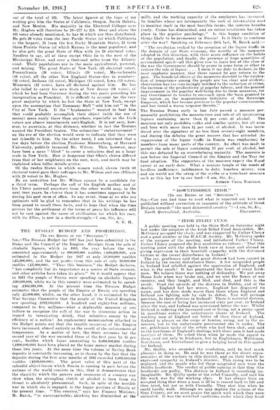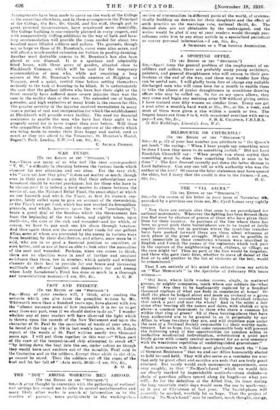"IRISH RELIEF FUND.
A public meeting was held in the Shire Hall on Saturday night last under the auspices of the Irish Relief Fund Association. Mr. McCirievy occupied the chair, and was supported by Father Clancy and a good number of the H.A.C.B. Society. Mr. Mearievy spoke of the purpose of the meeting, and introduced Father Clancy. Father Clancy proposed the first resolution as follows: "net this meeting joins with the whole Irish race at home and abroad in giving expression to their heartfelt sympathy with the distressed victims of the recent disturbance in Ireland.'
The rev, gentleman said that groat distress had been caused in Ireland by the recent disturbance there. A few misguided people in Ireland had rebelled against the oppression of England, and what is the result? It has penetrated the heart of every Irishman. We believe there was nothing of disloyalty. We put away Home Rule when war broke out, and we sent the flower of our country, and they fought, and bled, and died, and this is the result. Read the records of the distress In Dublin, and of the deaths. England lost her senses. England has disgraced its name, and has done deeds worse than those whom England and Ireland are fighting side by side to defeat. You will perhaps question, Is there distress in Ireland? There is material distress, because the cost'of living has increased sixty per cent. in'Ireland since the war, and Ireland was over-taxed before the war. Whilst Ireland is suffering the increased cost of living, not a penny spent in munitions enters the unfortunate shores of Ireland. The working men of England are better off than those of Ireland. Ireland is always on the verge of famine, owing, not to the resources, but to the unfortunate government she is under. The rev. gehtleman spoke of the rebels who had been shot, and said in the harshness of England's dealings with those men it bad made martyrs of them. He asked them when he made the appeal to them (and not only to Irishmen, but to Englishmen, Welshmen, Scotehmen, and Australians) to give a helping hand in this appeal for Ireland.
Mr. Quilty, who seconded the resolution, said he had much pleasure in doing so. He said he was there as the direct representative of the workers in this district, and on their behalf he expressed sympathy in Ireland's distresa. This rising was to be deplored, and the people who led those misguided men were the. Dublin landlords. The verdict of public opinion is that they (the landlords) are guilty. The distress in Ireland is something unimaginable. Mr. Quilty spoke of the rebel Connolly, and said his life work was for the working class. It has always been an accepted thing that when a man is ill he is reared back to life and then tried, but not so with Connolly. They shot bins when he could hardly walk. Although we may deplore the actions of the Sinn Feiners, yet we must praise the spirit with which they were animated. It was the wretched conditions under which they lived
Arraugeruents have been made to carry on the work of the College ia the meantime elsewhere, and in these arrangments the Principal ot the College, the Rev. Dr. Gould, and his staff, though put to great personal inconvenience, have acquiesced most cheerfully. The College building is conveniently planned in every respect,•and with comparatively trillingadditions in the way of bath and lavatory accommodation will provide the room needed for about two hundred more blinded soldiers and sailors. The grounds, though not so large as those of St. Dunstan's, cover some nine acres, and will afford a much-needed extension for tuition in poultry-farming. Another most desirable annexe to St. Dunstan's has also been placed at our disposal. It is a spacious and admirably fitted house, with three acres of garden, situated close to Blackheath Common, -which will be used for the temporary accommodation of men who, while not requiring a long sojourn at the St. Dunstan's seaside annexes at Brighton or Torquay, need a quiet, restful time before setting themselves seriously to the task of learning to be blinds it is unfortunately the case that the gallant fellows who have lost their sight at the front recently have suffered more severe injuries than was the ease in the earlier days of the war. The extended use of bombs, grenades, :mil high explosives of many kinds is the reason for this. The greater severity of the injuries received necessitates in many eases a period of rest and recuperation for which the establishment at Blackheath will provide every facility. The need for financial assistance to enable the men who have lost their sight to be properly cared for is more urgent than ever before. Will those who sympathite with them, and who approve of the efforts which are being made to render their lives happy and useful, send as much as they can afford to the Treasurer, St. Dunstan's Ffostel, Regent's Park, London, N.W. ?—I am, Sir, &R., C. ARTHUR PEARSON.













































 Previous page
Previous page